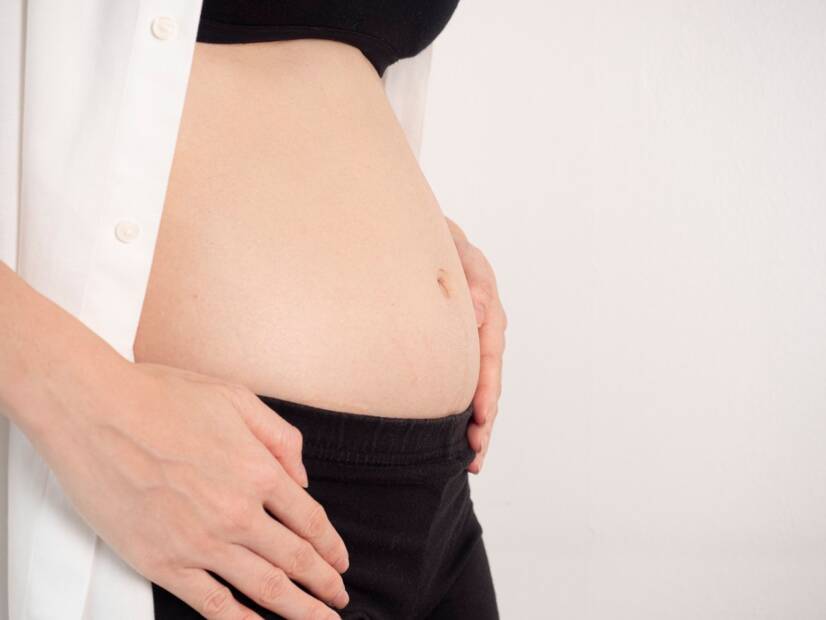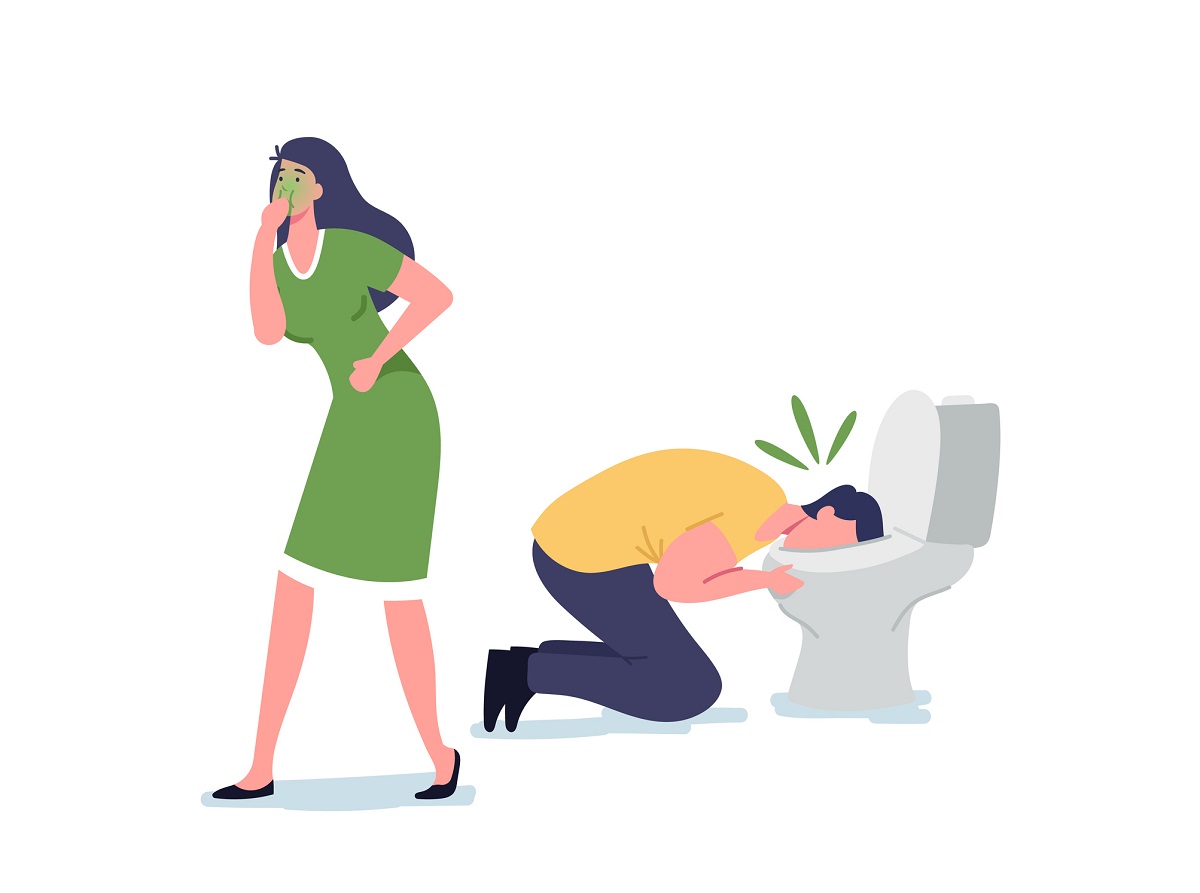- Pregnancy and childcare: Jane Symons
- The Miraculous Journey to Life: Rainer Jonas
- verywellfamily.com - Week 13 of Your Pregnancy, Holly Pevzner
- nhs.uk - Week-by-week quide to pregnanncy
- healthline.com - 13 Weeks Pregnant: Symptoms, Tips, and More, Ashley Marcin
13th week of pregnancy: what is the size of the baby? + Healthy diet as an important component

You've only recently found out you're pregnant. You're already 13 weeks pregnant. The fetus is beginning a period of rapid growth. Your belly is starting to protrude and round out.
Article content
From now on, the risk of miscarriage decreases.
In a week, you'll be entering the second trimester. Unpleasant symptoms like vomiting, nausea and frequent urination should be gone.
How is your baby developing in your tummy?
Your baby is now in a period of rapid growth. He will grow at lightning speed until the 24th week.
His approximate size at this week is 68-81 mm and weight 23 g.
The fetus is in approximately 100 ml of amniotic fluid.
Your baby's head is quite large compared to the body, with the eyes and ears already in place.
Its limbs are long and thin, with no fat reserves.
The skeleton is beginning to harden, especially in the long bones and skull, by the deposition of calcium taken from your diet and body.
His muscles and nervous system are maturing.
The facial muscles develop and the baby may frown or smile. And at this point, thumb sucking begins.
From the 13th week, the liver begins to produce bile dyes, which are already drained into the duodenum.
The kidneys begin to produce urine. The bladder is already faintly visible by ultrasound. The baby begins to swallow amniotic fluid, which it urinates back into the amniotic fluid.
The spleen produces red blood cells.
The lungs continue to develop and mature. The fetus inhales and exhales amniotic fluid to practice breathing.
The intestines move into the abdominal cavity and the bowel movements work.
The ovaries in girls and the testicles in boys are fully developed inside the fetus. Externally, the final touches are still being made.
The skin is soft and transparent.
The hair follicles have begun to develop. Fine hairs, called lanugo, appear and by the end of the 20th week, they cover the baby's body. The lanugo helps the vernix, a gooey substance, to adhere to the skin and together they protect the delicate skin of the fetus from getting wet and cracking in the amniotic fluid.
You can't feel your baby's movements yet, but your baby is constantly on the move, wiggling, twisting, stretching and kicking. He's still too small and light to feel his movements.
Even though it is so tiny, it is probably already able to put a finger in its mouth and suck it. This prepares and develops the sucking reflex that it will need after birth to receive breast milk. However, the sucking muscles are not yet developed.
The table shows the approximate measurements of the fetus at 13 weeks, as measured by sonography
| Total length | CRL Distance between vertex and coccyx | Weight | HC Head circumference | BPD Transverse head diameter | AC Abdominal circumference | FL Femur length |
| 10 cm | 68-81 mm | 23 g | 84 mm | 24 mm | 74 mm | 11 mm |
Read more about fetal size in the article:
Ultrasound in pregnancy: fetal size, what is fetal biometry?
The placenta nourishes your baby, supplying it with all the necessary nutrients and oxygen needed for its development. The placenta is constantly growing with the baby and will change throughout your pregnancy.
How does a woman feel in the 13th week of pregnancy
Your tummy is starting to grow, you can already see a small bubble peeking out from under your t-shirt.
Your uterus is growing, protruding out of your pelvis and you should feel the top of it just above your pelvic bone.
You may start to feel pain in your lower abdomen when you stand up quickly or when you change position. In most cases, these pains do not mean anything serious. But if you experience other symptoms such as temperature, shivering, or bleeding, you should see your doctor immediately.
The frequent urination is slowly subsiding. It's not bothering you as much as in previous weeks. Notice any changes. If you feel a burning, stinging sensation when you urinate, it may indicate a urinary tract infection that needs to be treated.
Morning sickness may still persist, which should subside as you enter the 2nd trimester.
Swollen, bleeding gums are common during pregnancy.
You may begin to experience pain in your side, which is caused by the growing uterus and your body adjusting to its growth.
More often, you may experience headaches as a result of increased fatigue and decreased blood sugar. Therefore, try to follow a regular diet and don't forget to get enough fluids and rest.
Dizziness often occurs between the first and second trimesters. It is caused by the hormone progesterone.
Nosebleeds can sometimes start without an obvious cause.
Throughout your pregnancy, you may experience bloating, gas and uncomfortable constipation, which is very common.
Another symptom occurring in pregnancy is indigestion and heartburn, especially after inappropriate food.
Painful and tense breasts will gradually fill with milk and prepare for breastfeeding.
Your body skin is drier. Itching and the first stretch marks may appear as a result of rapid weight gain.
You may be surprised by cramps in your legs at night. You are likely to have a magnesium deficiency in your blood due to the increased consumption of nutrients from your body. To replenish it, increase your intake of magnesium-containing foods such as bananas, dates, spinach, lentils, almonds.
What you may notice
You probably feel better than in previous weeks. Feelings of vomiting, morning sickness gradually decrease.
You may still feel exhaustion in the form of increased fatigue. As you enter the second trimester, the placenta takes over completely and you should feel an increased energy supply.
Second trimester some moms have no uncomfortable symptoms. Often they will all disappear by the end of the first trimester and you will be able to enjoy your pregnancy to the fullest.
Your tummy starts to grow slowly and you have noticed weight gain as well.
Your breasts are larger, tighter. The veins in your breasts are more prominent and your nipples are starting to darken more.
Some women begin to develop dark patches on their face, also called chloasma or pregnancy mask. This dark discoloration of the skin often disappears on its own after childbirth.

Your skin is oilier, your hair thicker and shinier.
Some women experience an increased appetite for sex, due to increased blood flow in the pelvic area.
Sex during pregnancy is safe unless you have some complications and your doctor has forbidden it.
If you notice swelling in your hands and feet, tell your doctor. It doesn't have to indicate a serious problem. But it's better if your doctor examines you to rule out any possible risks.
Urinary tract infections are also common in pregnancy and manifest themselves with discomfort, burning, stinging during urination and after urination. It is necessary to treat them.
Vaginal infections often present with discomfort in the genital area, itching, burning. Your doctor will take a swab and give appropriate and gentle treatment for you and your baby.
You may have noticed changes in your mood. No wonder. Your body is going through a lot of changes and it's affecting you a lot.
Stretch marks may start to appear as red or purple lines on your abdomen, breasts, hips, thighs. This is due to the growth of the skin and its rapid stretching, the effect of rapid weight gain and the rapid growth of the uterus. Genetics and hormones are also involved in the development of stretch marks.
The vaginal discharge may be thicker. If it is white or clear, it is normal. If you notice spotting, cramping or bleeding, see your doctor or hospital immediately. These may be signs of a miscarriage in progress.
What tests can I expect at the pregnancy clinic at 13 weeks of pregnancy?
You visit the clinic once a month unless your doctor has decided to monitor your condition and fetal development more often.
At each antenatal clinic, your urine is tested for the presence of protein in the urine, weight gain and blood pressure are checked.
If you missed your doctor's appointment in the previous week, he will do an ultrasound this week. The ultrasound is done between the 11th and 13th week of pregnancy. During the scan, your baby's development, measurement and the presence of any abnormalities will be checked. Your heart rate will be checked and you will hear your baby's heartbeat.
During this period, the mother's blood is also taken for Rh antibody testing if she has a blood group with a negative Rh factor.
Your doctor may find during the examination that you cervix is not closed and is dilating. In this case, a procedure called cerclage to close the cervix is considered to prevent an unwanted miscarriage. The procedure is also done if you had complications in a previous pregnancy or had a second trimester miscarriage.
Cerclage: what is it and when is it performed?
A cerclage is a stapling of the cervix that is only done during pregnancy.
This procedure is performed when a miscarriage or premature birth is imminent.
The procedure is done in hospital, under general anaesthetic. A special stitch is made to close the cervix to prevent premature birth.
The cerclage is removed two weeks before the planned delivery or if contractions begin in advanced pregnancy.
What we recommend and what to watch out for
- Try to avoid infection. Do not be in close proximity with a sick person suffering from an infectious disease, such as influenza, chickenpox, rubella.
- Take care of your skin, which is drier. By frequent lubrication and massage, you can also eliminate the appearance of stretch marks.
- Use a soft toothbrush on bleeding gums and brush your teeth with gentle circular movements.
- Practice Kegel exercises to strengthen your pelvic floor. These exercises will strengthen your pelvis, prevent urine leakage that can bother you later, especially when you sneeze or cough, and speed up healing of the birth canal after childbirth.
- The nausea will have subsided by now. It's a good time to start a healthy diet, especially by increasing your intake of vitamins, calcium and magnesium.
- Continue to take your pregnancy vitamins. They are freely available in any pharmacy and you can choose from a variety of products. Some are taken from the 13th week until the end of pregnancy, others are divided into trimesters. This will ensure that you get the vitamins needed for the growth of the fetus. If you do not know which to choose, consult your gynaecologist who will recommend the most suitable product.
- Follow a drinking regime, at least 2-3 litres of water per 24 hours. Enough fluids are needed to keep you hydrated, especially in the warm season.
- Get plenty of exercise. Walking is important, light exercises are good, pregnancy yoga is a good exercise.
- With a growing tummy, your clothes start to feel quite tight. Wear loose and comfortable clothes that won't push you.
- Avoid heavy and strenuous work and lifting heavy objects.
- Especially watch out for falls. Sports with a risk of falling, such as skiing, better be limited or take a break so that you don't get injured. A fall could disrupt the course of the pregnancy, and with that comes the risk of miscarriage.
- If you are employed and have not yet told your employer that you are pregnant, it is time to let them know.
- Avoid raw seafood like sushi, undercooked meats, unpasteurized foods, unwashed fruits and vegetables, raw eggs, alcohol and caffeine, and beware of certain herbal teas.
- If you have a cat in your home, clean its feces only with gloves to avoid coming into contact with the feces. They may contain toxoplasma gondii, which is dangerous to your baby and could harm its development or cause a miscarriage.
- Toxoplasma can also be found in raw meat, dried meat, unpasteurised goat's milk and cheese, so try to avoid eating these and always cook meat thoroughly.

What should the diet contain in pregnancy?
The main necessary components that a pregnant woman should take are proteins, sugars, fats.
Fish is healthy and contains omega-3 fatty acids. However, it is not a good idea to overdo it during pregnancy. It is recommended to eat fish 1-2 times a week. Be especially careful when eating fish that contain high amounts of lead. They should always be cooked. Salmon and cod are the most suitable.
Vitamin A is necessary for bone growth, fetal development, thyroid function. But do not overdose on it, with increased intake this vitamin remains in the body and is not processed. In pregnancy, taking vitamin A in the form of a supplement is a risk. High doses of this vitamin and subsequent overdose cause fetal developmental disorders.
Therefore, you should avoid consuming liver and liver products. They contain too much vitamin A. Suitable foods containing it are spinach, broccoli, carrots, lettuce and eggs.
B vitamins, which include folic acid, are very important for blood circulation and the nervous system. They are found in oily fish, leafy vegetables, yeast, carrots, wheat germ.
Vitamin C helps fight infections and is important for iron absorption. You can find it in citrus fruits, peppers, potatoes, garlic.
Vitamin D enhances the absorption of calcium, which is important for bones, teeth and the nervous system. The best source is sunlight. Of the foods, milk and eggs contain it.
Vitamin E supplies cells with oxygen and is important for the skin. You can find it in soybeans, wheat germ, butter, eggs, pumpkin seeds.
Vitamin K is important for blood clotting. It is found in eggs, yeast, leafy greens.
Fiber helps with proper bowel movements. Especially against constipation, which can plague you during pregnancy. You can find it in fresh fruits, vegetables, beans, oatmeal.
Iron is necessary to make haemoglobin, which binds oxygen to itself. During pregnancy, it is easy to become deficient in iron as blood volume increases, the uterus, fetus, placenta grow, and thus its consumption increases. The fetus takes iron stores so that the baby has enough for up to 6 months after birth.
Its deficiency leads to anaemia and fatigue in the mother.
You can find it in red meat, broccoli, raisins.
Your baby takes calcium from you for its bone and tooth development. You will find most calcium in dairy products. If you have a milk allergy or intolerance, you will also find it in salmon meat, soybeans, broccoli, sprouted vegetables and cereals.
What to avoid and what is forbidden for pregnant women?
- Raw fish such as sushi, completely avoid seafood, smoked fish
- Foods made from unpasteurised milk and milk products, such as cheese
- Fungal cheeses
- Liver for high vitamin A levels
- Undercooked or raw meat. Forget steak tartare, raw meat can contain various bacteria that are dangerous in pregnancy
- Beware of fish high in lead, which includes shark, swordfish and mackerel
- The quinine in tonic water
- Raw eggs
- Sausages that have not been cooked
- Raw sausages
- Alcohol
- Caffeine is allowed, but only in moderation
- Some medicines and herbal teas
Partner and pregnancy
Your partner may develop couvade syndrome, also known as male pregnancy syndrome or solid pregnancy. This syndrome develops in some men shortly after they learn that their partner is pregnant. However, it is most common at the end of the first trimester.
It arises from men's excessive empathy for their pregnant partner. It is more common in couples who have been trying for a long time to have a child.
They completely empathise with her feelings, as if they want to relieve her of unpleasant symptoms and help her by taking on some of the symptoms themselves.
They also experience morning sickness, abdominal pain, changes in taste, fatigue, mood swings, frequent urination, and may even experience breast enlargement. These symptoms cannot be suppressed by willpower.
Men really feel all the unpleasant symptoms.
Sometimes they can persist until the end of pregnancy, sometimes they persist even a few days after the birth.

Read more interesting articles:
- With folic acid to the longed-for baby and healthy blood vessels?
- How much to gain during pregnancy? What does it depend on and what to look out for?
- What is considered normal discharge? And how does an infection manifest itself?
- You are pregnant and you are troubled by pain in the lower abdomen?
- How to recognize pre-eclampsia and its symptoms in pregnancy? Know the risks
- In pregnancy, watch out for anemia. What are its causes, symptoms?
- Listeria and contaminated food: Why does it occur, how does it manifest itself?
About the other weeks of pregnancy in the summary article:
Pregnancyby weeks: How does pregnancy and fetal development proceed?
Gallery



Interesting resources
Related










